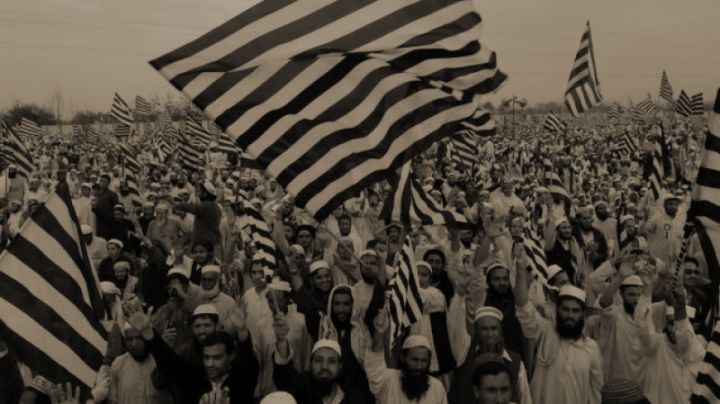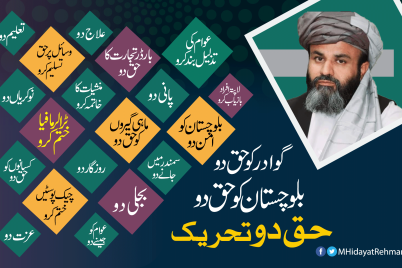Press censorship in Pakistan is usually subtle but it can be blatant too. If needed, Pakistan’s not-so-invisible government can shamelessly go to any extent to impose press censorship. On December 21, 2021, Hum TV administration received a phone call from a military officer to immediately stop TV anchor Mohammad Malick’s one-hour long TV show -- Breaking Point with Mohammad Malick -- only a few minutes after it had started. The TV administration did not have the option of saying ‘No’ and the program went off-air immediately without even the knowledge of the anchor. The reason was the presence of Hamid Mir – a celebrated dissident journalist – on the panel of the guests.
AV Staff Writer
The “unexpected” results of local bodies’ elections in the Pakistani province of Khyber Pakhtunkhwa have created unprecedented excitement across the opposition political parties. Most opposition politicians and political analysts agree that the ruling Pakistan Tehreek Insaf’s “humiliating” defeat – and Jamiat Ulama-e Islam (JUIF)’s victory — is the result of the Pakistani military’s neutrality. Unfortunately, this widespread impression is too good to be true, but it serves everybody’s political interests. Interestingly, the same analysts argue that, in the absence of a PTI candidate, the people voted for the Pakistan Peoples Party (PPP) candidate in Lahore by-election on December 5, 2021.
After eight years in power in Peshawar – and three years in Islamabad — PTI stands politically discredited and has become a liability for the Pakistani military which is being widely blamed for all its failures. Additionally, in the changed geostrategic situation, the military needs a government in Khyber Pakhtunkhwa – bordering Afghanistan — which can communicate with not only the Afghan Taliban but also with their Pakistani off-shoot — the Tehreek e Taliban Pakistan (TTP) and advance Pakistani military’s geostrategic agenda. The Pakistani military also needs a government in Peshawar that can help suppress Pashtun Tahaffuz Movement (PTM) — the growingly popular civil rights movement in Khyber Pakhtunkhwa — as well as the newly founded Pakistan Democratic Movement (PDM). The newly founded PDM has had a promising start by gathering many liberal and democratic forces under one umbrella.
The Pakistani military seems to be playing the same old game General Pervaiz Musharraf played to radicalize Khyber Phakhtunkhwa by gathering Islamist parties under the umbrella of Muttahidda Majlis-e-Amal (MMA) and then installing it as the provincial government — with JUIF’s Akram Khan Durrani as the provincial chief minister — in Peshawar in 2002. The MMA was also made part of the ruling coalition in Baluchistan and local governments in Karachi. In the National Assembly, it was an important political block with 58 seats. In the next five years, the misogynist MMA legislated Islamic laws usurping human and women rights in Khyber Pakhtunkhwa and played the role of an important pressure group for Islamic legislation. It helped unleash violence against women, artists, musicians, religious minorities, and LGBT community. Most importantly, the MMA helped the Pakistani military to carry out its policy of abduct-torture-kill-dump political opponents and innocent citizens with impunity in Khyber Pakhtunkhwa and Baluchistan. The rise of MMA led to unprecedented radicalization — particularly in Khyber Pakhtunkhwa, Baluchistan and Karachi — that ultimately paved the way for the announcement of Tehreek-e-Taliban Pakistan (TTP) in December 2007.
JUIF’s victory in the local bodies elections seems to be the first step towards bringing Islamists into power in Khyber Pakhtunkhwa in 2023. Pakistani military has used Islamists to counter and suppress liberal and democratic forces for the last 50 years. In East Pakistan, they propped up Jamat-e-Islami to counter Awami League in late 1960s and early 1970s. Jamat-e-Islami’s jihadist militias — Al-Shams and Al-Badr — massacred Bengali intellectuals and Awami League’s workers before the Pakistan Army surrendered to the advancing Indian Army on December 16, 1971. In addition to Islamists, General Ziaul Haq also strengthened other groups to counter PPP and other political parties. However, it was General Musharraf who perfected the art of suppressing democratic and liberal as well as nationalist forces with the help of Islamist and jihadist groups. The Musharraf regime supported Islamist and jihadist groups to take part in humanitarian and political activities to push the political forces in the background. In the first decade of the 21st century, the Musharraf regime encouraged such groups as Lashkar-e-Taiba in Sindh and Baluchistan — where nationalist groups were growing in strength — to work under the cover of charity organizations. As a result of this policy, Islamist terrorist groups have taken roots in Sindh and Baluchistan – where they were previously unknown.
For the last four years, the PTM has been agitating across the province and attracting record-breaking number of people and has become a major political force despite its non-political agenda. Every rally the PTM held in Khyber Pakhtunkhwa since January 2018 – when it held the biggest rally in the history of Islamabad since 1980 – attracted record number of Pashtuns. In a province where people come to the PTM rallies in record numbers, it is highly unlikely for an Islamist party like JUIF to get such victory in the local bodies’ elections while political parties like the Pakistan Muslim League and the PPP are nearly wiped out. All this shows the Pakistani military may not have been as neutral as the officially certified analysts want us to believe. The victory of JUIF in the local bodies’ elections in Khyber Pakhtunkhwa does not augur well for the future of democracy and peace in the region. If history can teach us anything – Islamist parties under JUIF will only continue the unfinished agenda of MMA. The “rise” of JUIF is without doubt a clear and present danger to Pakistan and the world. Follow us on Twitter at @AlterVoices




